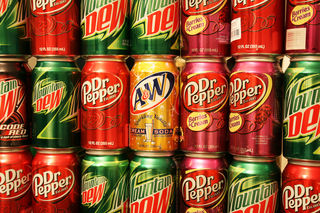Diet
How A Psychologist Lost Weight Drinking Soda
And Here's Why Flavor Might Make Us Fat
Posted April 29, 2017

The Story
About ten years ago I read a book called the “The Shangri-La Diet”1. It was written by Seth Roberts, a Psychologist at UC Berkeley, who has since passed away due to complications from coronary artery disease, (though there’s little reason to think the Shangri-La Diet was to blame).
Many years earlier Roberts had returned from a trip to Paris and realized that he had lost weight. So he tried to remember what he ate while on the trip, and the thing he remembered most were the sodas, which came in many flavors unavailable in the US.
Did the sodas cause him to lose weight? That seems counter-intuitive. According to many folks who study the issue, sugary sodas are one of the main culprits in the obesity epidemic. (Here is Robert Lustig’s popular presentation on the issue: Sugar, The Bitter Truth.)
Seth Roberts thought maybe it was the unfamiliar flavors that did the trick. And he proposed a theory to explain why that might be the case.
The Theory
According to his theory, our motivation to eat a particular kind of food will be a matter of how strong its flavor/calorie association is. A strong positive flavor, and lots of calories that hit the blood stream quickly, equals a food that practically begs to be eaten.
Pizza, tacos, donuts, candy bars, soda (at least normally), and macaroni and cheese all have strong, positive flavor profiles, and deliver a large dose of calories very quickly.
Plain baked potatoes, on the other hand, deliver a good amount of calories fairly quickly, but don’t have a strong flavor profile.
A kale, radicchio salad with balsamic vinegar dressing delivers a strong flavor profile, but few calories.
Some foods have a strong flavor profile, and plenty of calories, but the calories don't hit the bloodstream quickly due to a high fiber content -- lentil soup, for instance.
So the theory would predict that we will tend to over-eat pizza and donuts, under-eat plain potatoes and low calorie salads, and eat a middling amount of lentil soup.
Common sense might predict that as well.
What about Seth’s sodas? Those had a strong flavor profile and delivered a large dose of calories quickly. Shouldn’t the theory predict an increase in appetite rather than a decrease?
Roberts’ answer is that it takes time and repeated exposure to make these flavor/calorie associations. When we first try a new food, our brains and bodies don’t know to trust it. We eat a small portion and then wait and see what happens. If we get a good dose of calories, and aren’t made sick in any way by the food, then we associate the features of the food (such as flavor) with good calories. The more we eat the food and receive the reward of good safe calories for eating it, the stronger the association becomes, and the more we start trusting the signals.
When Roberts consumed sodas with unfamiliar flavors, this line of thinking goes, the sodas did not have a strong, positive flavor/calorie association (yet), and so they suppressed his appetite.
The Experiment
This principle of flavor/calorie association got Roberts wondering what would happen if he made a daily habit of consuming a substantial dose of calories with a very weak a flavor signal. What would happen to his appetite, for instance, if he just drank some sugar water quickly while plugging his nose and then rinsing his mouth out immediately to remove residual sweetness? Or what would happen if he drank some extra virgin olive oil?
In theory, it would suppress his appetite. His bloodstream would be flush with calories, reducing hunger. And he would have done nothing to trigger a desire to eat more calories.
Roberts put this idea to the test. Each morning he consumed about 400 calories of either sugar water or olive oil (presumably to rule out both low carb and low fat alternative explanations). And he claimed that it worked brilliantly for him, leading him to lose 25 pounds, which was about all he needed to lose. And that’s when he wrote his book.
Some Thoughts
I remember dabbling with the Shangri-La diet at the time and noticing some appetite reduction. But I didn’t test it well enough or long enough to see results he saw -- even if it does work.
That said, after reading Stephen Guyenet’s book, “The Hungry Brain”2, I suspect Roberts was onto something.
One question I have is about artificial sweeteners. It seems that Roberts’ theory would predict that artificial sweeteners would contribute to weight loss, because they weaken the association between certain flavors and calories. In fact, however, researchers have found a positive association between artificial sweeteners and weight gain.3
It could be that Roberts’ theory is somewhat off base, and the case of artificial sweeteners reveals its weakness. Or it could be that Roberts’ theory is sound, and that artificial sweeteners affect appetite in an additional way that counteracts their flavor-calorie association effects.
Regardless, it looks like strong flavor/calorie associations are something to watch out for. If we want to lose fat, it might be time to add fiber, reduce the calorie density of our foods, and stop making our foods taste better than they need to.
OK, sounds easy enough. But this idea has a glaring weakness. Reducing the flavor intensity and/or calorie density of our food is difficult. In today’s stressful world, we often depend on tasty food to lift our moods and give us some pleasure in life. In addition, our whole culture is built around junk food and comfort food. People bring donuts to office meetings just as a matter of custom. When we meet with others socially we tend to meet at restaurants and bars. When we celebrate anything together, there’s usually cake and ice cream. And many of us find these things difficult to resist.
Many people would frankly rather suffer through the familiar calorie-restriction routine than reduce the reward value of the food they do eat.
The Take Home Lesson
Though I’m going to stop short of recommending anyone try a flavor-restrictive diet (with me not being a medical doctor and all), I can tell you that many of the diet plans out there use some version of flavor restriction, whether they intend to or not.
Penn Jillette lost 104 pounds in 86 days eating just potatoes for the first two weeks, and then eating mostly leafy greens, berries and nuts after that.4 He claims he wasn’t overly hungry at any point during the diet. Could that have been because his diet severely reduced the flavor profile of his food? (Or did the nutrient/volume ratio matter more, as he and Joel Fuhrman might suggest?)
In a less extreme manner, many folks are seeing some success simply eliminating processed foods from their diets, and eating more whole foods. These people still eat a wide range of tasty foods, but nothing so overwhelmingly and quasi-addicting as pizza, donuts, and soda with familiar flavors.
And if you think you might want to try a flavor-limiting diet, and worry that you’ll miss the stress-reducing benefits of eating comfort food, “Clear Mind in a Complex World”5 might help reduce your stress a bit, allowing you to give it an honest try.
References
1. Roberts, Seth: The Shangri-La Diet.
2. Guyenet, Stephan: The Hungry Brain.
3. Sharon P.G. Fowler MPH, Ken Williams MS, Helen P. Hazuda PhD: "Diet Soda Intake Is Associated with Long-Term Increases in Waist Circumference in a Biethnic Cohort of Older Adults: The San Antonio Longitudinal Study of Aging", Journal of the American Geriatrics Society, Volume 63, Issue 4 April 2015, pages 708–715.
4. Jillette, Penn: Presto!
5. Stone, Jim: "Clear Mind in a Complex World" (free email course)




